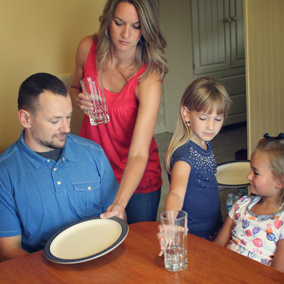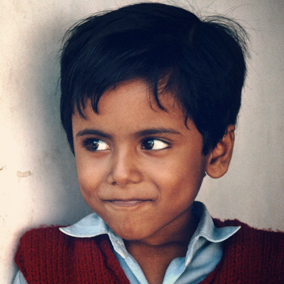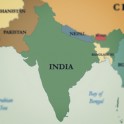Hi, my name is Gupta (goop-tah). Welcome to my home city of Hyderabad (high-druh-bahd) in southeast India. Most people here practice Hinduism, a religion with millions of gods, ancient writings, and special ceremonies like this one. Only boys from the highest castes can participate in the Ceremony of the Sacred Thread, usually at around age eight or nine.
Fortunately, I come from a family of Brahmins, the highest ranking, most powerful group in India. Down through history, Brahmins were advisors to the kings. Today, we have the best, highest paying jobs. My father is a doctor and my mother is a scholar of our ancient Sanskrit language. Other groups within India respect us because all Hindu priests, the men who’ve been trained to read and understand the ancient writings of our religion, are Brahmins.
This morning I woke up early. Excitedly, I took a bath and put on the new clothes that Mother laid out for this special occasion. After breakfast, Father and I stood in front of the small statue of our house god, praying and offering a sacrifice of rice. Then the two of us walked to this neighborhood temple. Mother stayed home to prepare food for the celebration that will follow the ceremony. We are expecting many guests.
But right now, I sit on this mat, legs crossed, eyes closed, heart racing in anticipation. Father sits on my left. On my right is a guru. This teacher leans close and whispers something into my ear. It is a chant that speaks of the ways of our Hindu religion. Then I open my eyes as Father loops the white, cotton string around my chest and back like a sash and straightens it across my left shoulder. Like other Brahmin men, I will wear a white string like this for the rest of my life. It symbolizes my desire to be wise, strong, and honorable in my family and community. The braided string has three strands, reminding me to be pure in three ways – in my thinking, words, and behavior.
Father smiles at me and announces, “My son, today, you have become a man.” Other men surround me saying, “Gupta is twice-born.” This means I was first born as a baby, but now I am old enough to begin my spiritual life. I will learn how to come closer to God by being good, studying Hindu scriptures, and following the ways of my religion.
You’re invited to my home for the big celebration. We are vegetarians, eating no meat, but you will enjoy my mother’s good cooking – spicy, vegetable curry and rice along with mango chutney to cool your tongue. Many guests will give me money and gifts on this special day.

Family Activity:
Brahmins are the highest ranking families in India. How do they expect Dalits (dah-leets), considered the lowest people, to treat them? Cut a slip of paper for each family member. Write Brahmin on half of the slips and Dalit on the rest. Have each person choose a slip of paper to discover his rank. Each person will take on his high or low class role during a meal. Read the following rules for Brahmins: You do not set the table, clear, or do dishes. You can ask the Dalits to serve you. Do not sit next to the Dalits. You may have two helpings of food. Now read rules for Dalits: You will set the table, serve the Brahmins dinner, and clean up after them. Do not sit next to them or speak to them unless they ask you a question. You may not have more than one helping of food. After the meal, talk about this experience. Allow each person to share how he felt during the role-playing. Read Philippians 2:3-11 and talk about how Jesus wants us to treat others people.
Option: For small families, consider doing this story and activity with family friends or your small group.
Pray:
- In India, many believers in Jesus are Dalits. Brahmins think that becoming a believer in Jesus will lower their spiritual position and place in society. Pray that their eyes will be opened to see that Jesus offers them eternal life as children of the King of Kings.
- Brahmins believe they are guardians of Hinduism and were created to instruct people in their spiritual journey. Others respect and look up to them. Pray that God will draw Brahmins to Himself and that they will be used to teach many Indian families how to love and follow Jesus.
Brahmin of India
Pumpkin Halwa
Sweet Pudding
South Asia
Preparation Time: 25 | Serves: 4-5
Ingredients
- 1 can pumpkin (15 ounce) or 2 cups mashed/pureed fresh pumpkin
- 1 stick unsalted butter (8 tablespoons)
- ⅔ cup milk
- ⅓ cup sugar
- ¼ teaspoon ground cardamom
- nuts (slivered almonds, pistachios, or cashews)






